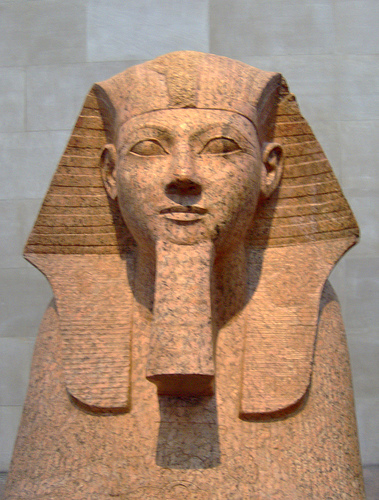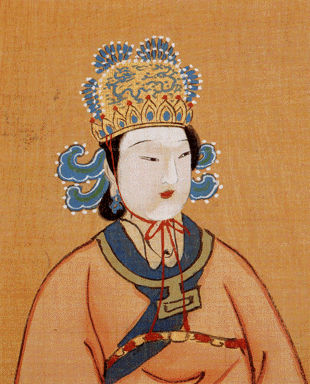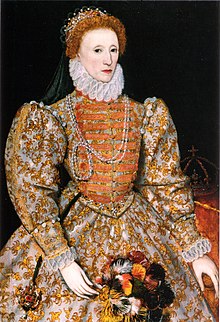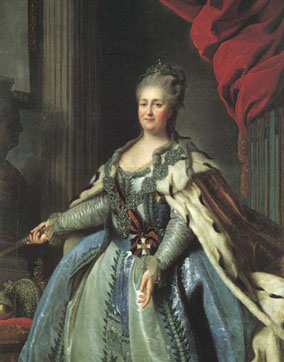10)

Cleopatra: Over a reign of 21 years, Cleopatra (born Cleopatra VII Philoapator) ruled as the last pharaoh of Egypt. Unlike many of those on this list, her 'power' does not rest with the territories under her control but instead, the men under her control. Egypt, by this time, was only a vassal state of the Rome and in this sense, there were probably more powerful women that could have taken this position, notably Eleanor of Aquitaine or Empress Lu Zhi of the Han Dynasty. However, none of them could manipulate two of the most influential and powerful men (Julius Caesar & Marc Anthony) in her generation to take up arms on her behalf. As a member of Greco-Egyptian Ptolemaic Dynasty, Cleopatra had initially ruled jointly with her brother Ptolemy XIII but with the aid of Julius Caesar, defeated (and allegedly murdered) her younger uniting Egypt under her reign. With the death of Caesar, she was able to woo Mark Antony in wage a civil war against Octavian (later known as Augustus Caesar) that led to the fall of the Roman Republic and the formation of the Roman Empire. Her legacy, and her position on this list, shows that her influence and power reverberates beyond Egypt but throughout the entire Mediterranean and the world.
Political Might: 2
National Strength: 1
Legacy: 3
Influence: 3
Average: 1.5
9)

Empress Theodora I: The fairy tale notions of beginning to poverty and ending up the most powerful women in the lands could not be better embodied by anyone other than Empress Theodora I of the Byzantine Empire. She started out as an actress (which basically meant prostitute of the time) but impressed Justinian I (later known as Justinian the Great) enough that he changed laws (which forbade the wedding of royals to actresses) to marry her. During the crisis of the Nika riots, it was her leadership that saved the Justinian's reign - motivated by her wife's words "purple makes a good shroud" (insinuating it was to better to die as emperor than live as commoner), the riots were put down and Justinian continued to reign for decades to come. After the riots, her courage in the face of death was remembered by Justinian; because of this, she wielded considerable power and made great efforts towards architecture (rebuilt Constantinople) and religion (the construction of Hague Sophia). Perhaps because of her own upbringing, her greatest of contribution of all was towards the sexual equality. Women's rights, with her additions to the Justinian Civil Code, were greatly improved the Justinian Civil Code still forms the basis of many common law systems today.
Political Might: 1
National Strength: 4
Legacy: 2
Influence: 2
Average: 2.25
8)

Hatsheput: The longest reigning female pharaoh of Ancient Egypt, Hatsheput reigned over Egypt during the famed 18th dynasty when Egypt was becoming an Empire. (for more info on the Egyptian 18th dynasty, check out http://sophos-square.blogspot.hk/2012/06/founder-of-18th-dynasty-ancestor-of.html) She commonly believed to be one of Egypt's most successful pharaohs and laid the groundwork for Thutmose III's splendid reign. More importantly, she contributed vastly to improving the economic and military status of Egypt during her rule. The century-long Hyksos invasion and occupation had shattered Egyptian trade which was not restored during Hatsheput's reign. Militarily, she launched a large expedition to the south of Egypt capturing the Land of the Punt (most often believed to be the Horn of Africa). Moreover, she also launched successful invasions into Nubia and Syria. Her twenty-two year reign around 1500 BCE made her the earliest female ruler included in this list; however, this is also the reason she cannot be placed any higher as her influence upon the modern world had is lacking compared to the others on this list.
Political Might: 3
National Strength: 4
Legacy: 1
Influence: 1
Average:
7)
 Maria Theresa of Austria: Immediately to taking her throne as empress of Austria, Maria Thersa's grip on the control of the Hapsburg lands was challenged. A Prussian-led coalition began the War of Austrian Succession to dispute her claim to the throne but was repelled nineyears later with the signing of the Treaty of Aix-la-Chapelle. Her husband, Holy Roman Empeoror Francis I, ruled de jure and it was Maria Theresa who was the true power behind the scenes. Her reign marked the beginning of Austria's ascension into the one of the elite powers of continental Europe and this accomplishment can be accredited to her reforms. Financial,agricultural and educational reforms improved Austria's economy and this was further improved by her alliance with France, a traditional enemy. The originally weak Austiran military was also strengthened and greatly enhanced during her reign. Her sons, Joseph II and Leopld II both became renowned Holy Roman Emperors in their own right and Joseph was particularly successful becoming one of the three great Enlightenment Monarchs (with Peter the Great and Catherine the Great)
Maria Theresa of Austria: Immediately to taking her throne as empress of Austria, Maria Thersa's grip on the control of the Hapsburg lands was challenged. A Prussian-led coalition began the War of Austrian Succession to dispute her claim to the throne but was repelled nineyears later with the signing of the Treaty of Aix-la-Chapelle. Her husband, Holy Roman Empeoror Francis I, ruled de jure and it was Maria Theresa who was the true power behind the scenes. Her reign marked the beginning of Austria's ascension into the one of the elite powers of continental Europe and this accomplishment can be accredited to her reforms. Financial,agricultural and educational reforms improved Austria's economy and this was further improved by her alliance with France, a traditional enemy. The originally weak Austiran military was also strengthened and greatly enhanced during her reign. Her sons, Joseph II and Leopld II both became renowned Holy Roman Emperors in their own right and Joseph was particularly successful becoming one of the three great Enlightenment Monarchs (with Peter the Great and Catherine the Great)Political Might: 3
National Strength: 3
Legacy: 3
Influence: 3
Average: 3
6)

Isabella of Castile: Since this is a list of powerful female rulers, instead of merely on account of merit, Isabella I of Castile must be included. Her influence and legacy stretches to the modern day as the monarch who sponsored Christopher Columbus' voyage to the Americas. This led to the construction of a great Spanish Empire in the Americas stretching from parts of modern-day Canada and United States to the north and the Falkland Islands in the south. Yet, during her own time, she was best known for her religious prejudice against non-Catholics. The infamous Spanish Inquisition was begun in her reign who led to the forced-baptism and expulsion of tens of thousands of Jews and Muslims. Recently converted members of both religions were also persecuted and thousands were tortured and executed. Moreover, she completed the Spanish reconquest of territories captured by the Muslims during the previous centuries. When viewed in retrospect, her actions against the non-Catholic populace in Spain would probably be viewed as a crime against humanity; however, without the efforts of Queen Isabella, Latin America would not exist in its modern capacity.
Political Might: 3
National Strength: 2.5
Legacy: 3.5
Influence: 3.5
Average: 3.125
5)

Wu Zetian: Out of the many emperors that had ever ruled imperial China, only one of them was a woman - Empress Wu Zetian. As a concubine initially for Emperor Taizong of the Tang Dynasty, she was a doomed to a fate of celibacy as a Buddhist nun after Taizong's death. However, she was brought back by Empress Wang in a power struggle within Emperor Gaozong (Taizong's successor)'s harem between Wang and Consort Xiao, one of Gaozong's favorite concubines. With shrewd political maneuvering and exploiting her own child's death, Wu managed to wrestle the position of Empress from Wang and executed by Wang and Xiao. Emperor Gaozong was not a particularly competent or attentive ruler and by the end of his reign, Empress Wu was making most of the major decisions. Seven years after Gaozong's death, Empress Wu, now Empress Dowager Wu, claimed the throne for herself setting a precedent none would attempt again - a female emperor (she interrupted the Tang Dynasty and begun the Zhou Dynasty, not to be confused with the Zhou Dynasty that ended with the Qin reunification of China). During her reign, she improved the Chinese bureaucratic system and made it into a meritocracy and nepotism was on decline. The spread of Buddhism within China was also greatly expanded. The military problems that plagued the rule of Taizong and Gaozong were ceased with a decisive victory in 692 CE. Agriculture and woman rights other aspects that Wu improved during her reign. However, despite her achievements, her ruthlessness (and paronia once she became emperor) also resulted in the deaths of many innocent people who simply got in her way. While she was undoubtedly the most powerful women who ruled over the superpower of the day, her legacy had been tarnished over many generations of Chinese Confucianism and historical revisionism had only recently restored her reputation as a competent ruler.
Political Might: 5
National Strength: 5
Legacy: 2.5
Influence: 2.5
Average: 3.75
4)

Elizabeth of England: Queen Elizabeth, the Virgin Queen, was not the first or the only female ruler in English history but she was undoubtedly the first who would rule successfully. After a bitter power struggle between her and her half-sister Queen Mary of Scots, Queen Elizabeth would rule as undisputed queen over a rising power. Under her reign, she improved the naval technology of race galleons developed during her father's reign and decisively defeated the Spanish Armada (with some help from mother nature). Her reign also saw the establishment of the English Protestant Church and cemented Protestantism in England for centuries to come. Despite this, she was surprisingly tolerant towards other religions and did not systemically eradicate Catholicism in England. This helped her creation of remarkable stability throughout her reign despite natural disasters and continuing overseas conflict. Moreover, she oversaw the introduction of Renaissance into England improving the quality of life. On another note, the reputation of England as a military power was also finally revived during her reign after centuries of being a second-tier European state. Yet, it was her just rule that allowed for the arts to flourish during her rule. Elizabethan literature such as Shakespeare or Marlowe is still considered the epitome of English culture. Her reign marked the beginning of England as a cultural and military elite and her legacy continued throughout English history. Whenever crisis arose over the next centuries, it was her image and reputation that was turned to for inspiration and guidance.
Political Might: 3.5
National Strength: 3
Legacy: 5
Influence: 4
Average: 3.875
3)

Queen Victoria: Queen Victoria, the grandmother of Europe, was the longest reigning queen in history with a rule that spanned almost seven decades. She also ruled over the largest empire the world had ever seen. Besides being the Queen of the United Kingdom, she also began the usage of the title Empress of India during the 1870s. During her reign, the British Empire spanned every continent in the world and ruled over a fifth of the world's population as well as territory. With such power in the international world, Britain under Queen Victoria served as the global policeman (imagine the United States but about five times more powerful) and reinforced the Pax Britannica. During her reign, there was only one significant war between nations (the Crimean war) and most others were relatively minor skirmishes. Besides international standing, Britain also developed domestically becoming a leader in culture, technology and wealth. The Industrial Revolution had been well underway since her forebears' reign but it was not until the Victorian period when it reached full maturity. It was under reign that the problems of the industrialization were slowly being eradicated and quality of life began improving. On a personal level, her children all married into royal or aristocratic families; of her 26 surviving grandchildren, all did the same. Because of this, by the First World War, she was related to almost all royal European houses. This status, as well as her own moral reputation, made her a role model for women during the Victorian era. However, this is one very important reason as to why she is not higher on this list - Britain during her reign had evolved into a bicameral constitutional monarchy. As such, her personal power was limited and it was her influence over the British Empire (and therefore, the world) as well as the power of her descendants that made her powerful. Yet, this meant her power could not be compared to the final two members of this list.
Political Might: 1
National Strength: 5
Legacy: 5
Influence: 5
Average: 4
2)

Empress Dowager Cixi: A consort of Emperor Xianfeng, Cixi became the de facto ruler for China for around 47 years from 1861 - 1908 with only brief interruptions after the death of her husband and her son Emperor Tongzhi coming to the throne as a minor. Originally, Cixi was lower ranking of the two Empress Dowagers, the other being Cian (the principal wife of Emperor Xianfeng). The position of Empress Dowager normally carries no political authority but through shrewd political moves, Cixi convinced Cian to assist her in ousting the eight regents for the empire with the assistance of Prince Gong and Prince Chun (sons of Emperor Daoguang and brothers of Emperor Xianfeng). After seizing power, she began ruling China behind the curtains throughout the reign of Emperor Tongzhi and after his death, picked Prince Chun's son to become the next ruler, Emperor Guangxu. Her rule became even more absolute with the death of Empress Cian and even during her lifetime, Cian's interest in politics were relatively limited. Demonstrations of her power include the ousting of Prince Gong, who had become immensely power through competence and political savvy, despite opposition from the imperial court. When Emperor Tongzhi attempted to take control of the court for himself, Cixi made an unprecedented move appearing in the imperial court (without the curtain) and forced the emperor from power. Years later, she did the same with his successor; when Emperor Guangxu began reforms that she disapproved of, she placed him under house arrest in the middle of lake zhongnanhai within the Forbidden City. Even before this, she spent the budget for the Beiyang army and navy for her own entertainment including the furnishing of the Summer Palace. Lastly, the death of Emperor Guangxu was "coincidentally" one day before her own and evidence have shown evidence of arsenic poisoning. Even the last Emperor the China, Emperor Xuantong more commonly known as Puyi was personally chosen by Cixi to inherit the throne. Overall, her reign marked the irreversible decline of the Qing Empire and imperial rule in general. Her own obsession with power caused the lost of many able officials within the Qing court and during the Hundred Day Reforms when Emperor Guangxu actually ruled, he had proven to be very capable. If not for Cixi, it was possible that imperial China could survived and modernized similar to the Japanese Meiji Reforms.
Political Might: 4
National Strength: 5
Legacy: 4.5
Influence: 4.5
Average:4.5
1)

Catherine the Great: The only woman since the Englightenment to carry the title, the Great, Catherine cannot be denied her rightful position on the top of this list. Her empire, although smaller than Queen Victoria's, was the largest empire of its day and not only so, but was a contiguous empire and not separated by vast oceans. Moreover, her rule was absolute; Russia was an absolute monarchy. During her reign, Russia began expanding in all directions save for the north (there is simply nowhere to expand). In the south, Catherine's borders reached into traditional Ottoman territories straddling the Black Sea; in the west, she partitioned the kingdom of Poland; in the east, Russia had begun the colonization of Alaska. The modernization efforts continued in the model of that seen during the reign of Peter the Great and despite numerous rebellions, Catherine managed to maintain an iron grip throughout Russia. Because of these accomplishments, her reign is widely viewed as the golden age of the Russian Empire. This makes Catherine the Great the obvious choice for the single most power female ruler of all time.
Political Might: 5
National Strength: 5
Legacy: 5
Influence: 4
Average: 4.75
Honorable Mention:
Empress Lu Zhi of the Han Dynasty ordered the death of many individuals who threatened her power, most notably Han Xin (renowned general), Peng Yue (military and political leader) and Liu Ruiyi (prince), amongst many others. She also influenced the imperial succession opposing her husband, Emperor Gaozu,'s wishes to replace their son Liu Ying with Liu Ruiyi (Gaozu & consort Qi's son) as crown prince. She also disposed of Emperor Qianshao and had him executed after he threatened her. During the reign of three emperors, Hui, Qianshao and Houshao, she maintained immense influence and was the de facto ruler of China.
Eleanor of Aquitaine was the duchess of Aquitaine in her right, queen consort of France and later England. She was one of the most powerful woman in the middle ages and notably, she assisted her son Henry the Young King's rebellion against her husband Henry II of England and served as regent during her son Richard the Lionheart's absence in the Third Crusade.
沒有留言:
張貼留言